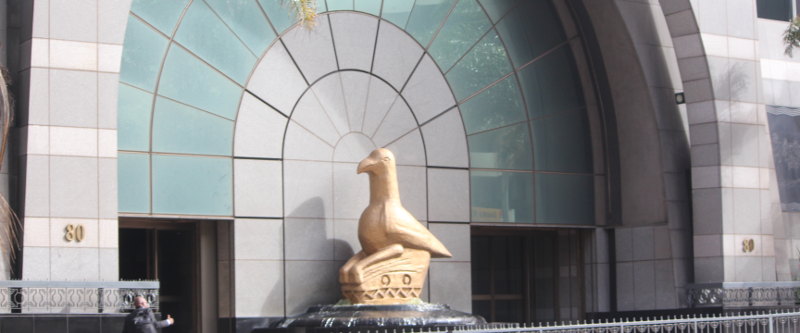In 2016 The Reserve Bank of Zimbabwe (RBZ) introduced the Financial Inclusion Strategy with the obvious aim of drawing a marginalized number of people who are unbanked into the financial system. The Strategy is highlighted by an ambitious plan to increase the banking population from 30% at the time it was implemented to at least 90% by 2020. The affirmative action targets groups such as Micro, Small and Medium-sized Enterprises (MSMEs), women, youth, rural population and the small-scale agricultural sector.
Whilst the strategy seems overarching, it forgot to include Muslims who are known for not banking their money. This practice by some Muslims is not borne out of civil disobedience but a religious observance. Islam tenets discourage or forbid Muslims to associate their money with interest bearing institutions. Since conventional banks thrive on interest, some Muslims spurn banks and keep their money under their beds.
The form of banking that includes Muslims in the financial system is called Islamic Banking or popularly known as Islamic Finance.
What is Islamic Finance?
In the context of this article, Islamic Finance is a type of banking that forbids the accumulation or charging of interest by a person or a company. This prohibition stems from the verses in Koran, practices, and sayings of prophet Mahomed, Islam’s founder. Islamic Finance is a form of banking that can be done by a Muslim or non-Muslim.
Even though many people think of Islamic Finance as a branch of a broader finance category, in essence, Islamic Finance is an economic system that is different to capitalism, socialism or mixed economy because of the dominant role played by religion in creating value.
Currently, Zimbabwe doesn’t have a financial institution which satisfies the unique needs of Muslims in terms of having activities that don’t generate interest so that’s why Muslims continue being excluded in the financial system or perhaps being forced to participate against their conscience.
Why should Muslims matter to RBZ?
Zimbabwean Muslims have a population of about 100 000 and let’s suppose that all these people are not banking their money. Imagine how many customers banks are losing out by not providing banking services that meet the particular needs of Muslims. Not to mention that many Muslims in Zimbabwe are small business owners, so it can be speculated that they own a significant chunk of the total money supply.
Including Muslims in the Financial Sector…. A modest proposal
RBZ as the biggest proponent of Financial Inclusion and the regulatory authority which has financial resources should initiate the introduction of Islamic Finance through setting up a financial institution that practices this form of banking.
RBZ can encourage existing banks to open Islamic Finance windows that accommodate Muslims. An ‘Islamic window’ in Islamic Finance sense means that a bank that engages in interest-bearing activities can open up a department of Islamic banking that is divorced from the interest-bearing operations of the same bank. ABSA and FNB Bank in South Africa and many banks in Europe have opened Islamic windows that target banking needs of Muslims. And of course, the encouragement by RBZ should be underpinned by favourable regulations that lure banks.
Another alternative is RBZ partnering with investors or local banks to set up an Islamic Finance institution. Also, banks as a whole could set up an Islamic Bank that models ZimSwitch’s structure, in which all the banks have a stake.
Despite the simplistic modeling and analysis of Islamic Finance, Islamic Finance is a sector that is fast becoming attractive for Muslims and non-Muslims and a bank or microfinance institution that ventures into this sector could prosper.
Islamic Finance gained popularity just after The Global Financial Crisis of 2008 among Muslims and non-Muslims and it continues to witness exponential growth since then. RBZ should make efforts to make their Financial Inclusion Strategy a real inclusive initiative for everyone by setting institutions that meet Muslims’ banking needs.


2 comments
Muslims have been in zimbabwe for many generations. We have integrated into zimbabwe and Muslims do a lot of relief work in zimbabwe helping those in need of all faiths and cultures. Islam means “peace. We believe in being rewarded or punished by God for our good or bad deeds. We also bound to always help our fellow man from all religions.
Islam teaches us to follow the rules of the land we reside in. Amongst the beliefs that we have is that we are not allowed to have any dealings in interest within the banking system. So we do not consume interest because we have not earned that money. Many Muslims withdraw the interest money accumulated in their bank accounts and donate it to organisations who would need it without any benefit to us. As for paying interest to banks, it is the system of the land and we respect it and we follow it. Allah (God) is most merciful and most forgiving
Muslims cannot run businesses and charge mark up and make profit from non Muslims and refuse to bank that money because someone else will make profit from interest.They should leave business altogether then.If they dont want to earn interest, fine they can bank and not receive interest but refusing to bank simply because that money will be lent to others is pure greed.How about non Muslims stop buying from them because that money will not be banked, how will they cope?